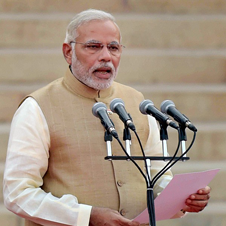 POST WRITTEN BY: Sanjeevi Seshadri, 4th Year Candidate, Bachelor of Laws (Hons.) at National Law University, Delhi; and Kanwar Vivswan, 4th Year Candidate, Bachelor of Laws (Hons.) at National Law University, Delhi
POST WRITTEN BY: Sanjeevi Seshadri, 4th Year Candidate, Bachelor of Laws (Hons.) at National Law University, Delhi; and Kanwar Vivswan, 4th Year Candidate, Bachelor of Laws (Hons.) at National Law University, Delhi
Pace International Law Review is honored to feature State Dinners & Summons: Mr. Modi’s trip to New York from our guest bloggers Sanjeevi Seshadri and Kanwar Vivswan. Both Sanjeevi Seshadri and Kanwar Vivswan are from New Dehli, India and are 4th year candidates for Bachelor of Laws at National Law University in Delhi. Sanjeevi Seshadri hopes to pursue a career in litigation and is very interested in international investment law, international criminal law and the law of treaties. Kanwar Vivswan wishes to pursue a career at the UN and is interested in public international law, international environmental law and international law for protection of intellectual property. Theirpost, “State Dinners & Summons: Mr. Modi’s trip to New York,” looks at how summons was issued in September 25, 2014 by A New York Federal District Court pursuant to a complain by the American Justice Center, which sought compensatory and punitive damages for crimes against humanity, cruel and unusual punishment and other allegations perpetrated by Narendra Modi, the current Prime Minster of India. The post analyzes how the complainant has failed to establish that civil universal jurisdiction has the same scope as criminal jurisdiction in enforcing these international norms:
In 2005, the United States of America denied Mr. Modi a visa while he was the Chief Minister of Gujarat. Today, Mr. Modi is the Prime Minister of India and is a state guest of the United States, yet, he still faces challenges in the land of the free. A New York federal District Court issued a summons to Mr. Modi on September 25, 2014. The summons was issued pursuant to a complaint by the American Justice Centre [AJC], an American NGO, that sought compensatory and punitive damages for “crimes against humanity; cruel, inhuman, or degrading treatment or punishment; extrajudicial killing; wrongful deaths; negligence; public nuisance; battery; and intentional infliction of emotional distress” allegedly perpetrated by Mr. Modi.
The complainant states that under international law, Mr. Modi can be prosecuted for the said crimes in the U.S. under the principle of universal jurisdiction, whereby a state may exercise jurisdiction over serious crimes (such as genocide, torture and war crimes) even if there exists no connection, based on territory or nationality.
In this post, it will be argued that the complainant has failed to establish in the lawsuit whether civil universal jurisdiction (under which damages are being claimed in this case) has the same scope as criminal jurisdiction in enforcing these international law norms. In this regard, we argue that the summons against Mr. Modi is not sustainable under international law. . .
Take a moment to enjoy reading the full article State Dinners & Summons: Mr. Modi’s trip to New York. If you would like to contact the authors of this post, Sanjeevi Seshadri can be reached at seshadri.sanjeevi@gmail.com, and Kanwar Vivswan can be reached at Kvsingh92@gmail.com.
Image Source: Rediff News
Total internetaholic